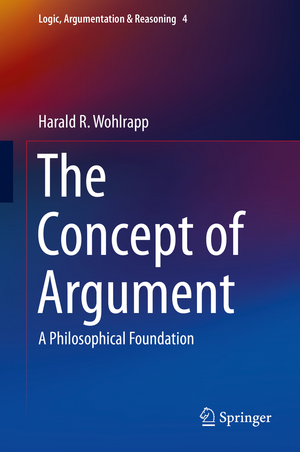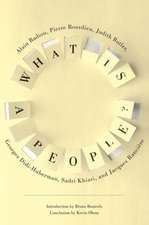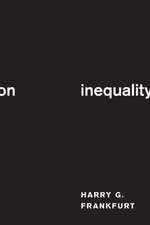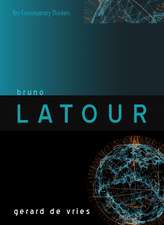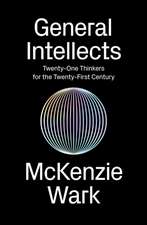The Concept of Argument: A Philosophical Foundation: Logic, Argumentation & Reasoning, cartea 4
Autor Harald R. Wohlrappen Limba Engleză Hardback – 11 iul 2014
Excavating foundational issues such as the purpose of argument itself (assent of an audience or critical examination of validity claims) and the contested role of argument as a generator of knowledge, the book culminates in a discussion of the relationship between rationality and reasonableness and criticizes the restrictions of ‘rational’ argument relying on fixed logical, economic or cultural criteria that in reality are mutable. Here, a true, open argument requires the infusion of Paul Lorenzen’s principle of ‘transsubjectivity’, which recognizes but transcends the partiality of the individual and which can be seen in the pragmatic and expanding consensus that humanity can control itself to safeguard the future of a fragile, damaged world.
| Toate formatele și edițiile | Preț | Express |
|---|---|---|
| Paperback (1) | 650.69 lei 6-8 săpt. | |
| SPRINGER NETHERLANDS – 27 sep 2016 | 650.69 lei 6-8 săpt. | |
| Hardback (1) | 657.25 lei 6-8 săpt. | |
| SPRINGER NETHERLANDS – 11 iul 2014 | 657.25 lei 6-8 săpt. |
Din seria Logic, Argumentation & Reasoning
- 15%
 Preț: 577.54 lei
Preț: 577.54 lei - 20%
 Preț: 580.83 lei
Preț: 580.83 lei - 15%
 Preț: 650.19 lei
Preț: 650.19 lei - 20%
 Preț: 524.12 lei
Preț: 524.12 lei - 15%
 Preț: 643.48 lei
Preț: 643.48 lei - 18%
 Preț: 723.06 lei
Preț: 723.06 lei -
 Preț: 394.12 lei
Preț: 394.12 lei - 15%
 Preț: 695.53 lei
Preț: 695.53 lei - 15%
 Preț: 643.34 lei
Preț: 643.34 lei - 20%
 Preț: 513.14 lei
Preț: 513.14 lei -
 Preț: 398.92 lei
Preț: 398.92 lei -
 Preț: 387.96 lei
Preț: 387.96 lei - 15%
 Preț: 643.34 lei
Preț: 643.34 lei - 15%
 Preț: 490.93 lei
Preț: 490.93 lei - 18%
 Preț: 726.23 lei
Preț: 726.23 lei - 18%
 Preț: 733.78 lei
Preț: 733.78 lei - 18%
 Preț: 895.56 lei
Preț: 895.56 lei - 15%
 Preț: 696.02 lei
Preț: 696.02 lei - 15%
 Preț: 634.68 lei
Preț: 634.68 lei -
 Preț: 354.54 lei
Preț: 354.54 lei - 18%
 Preț: 723.38 lei
Preț: 723.38 lei - 18%
 Preț: 723.56 lei
Preț: 723.56 lei - 24%
 Preț: 801.68 lei
Preț: 801.68 lei - 15%
 Preț: 634.49 lei
Preț: 634.49 lei - 18%
 Preț: 728.43 lei
Preț: 728.43 lei - 18%
 Preț: 789.98 lei
Preț: 789.98 lei - 18%
 Preț: 787.78 lei
Preț: 787.78 lei - 18%
 Preț: 918.30 lei
Preț: 918.30 lei -
 Preț: 397.16 lei
Preț: 397.16 lei -
 Preț: 392.97 lei
Preț: 392.97 lei
Preț: 657.25 lei
Preț vechi: 773.23 lei
-15% Nou
Puncte Express: 986
Preț estimativ în valută:
125.76€ • 131.66$ • 104.06£
125.76€ • 131.66$ • 104.06£
Carte tipărită la comandă
Livrare economică 05-19 aprilie
Preluare comenzi: 021 569.72.76
Specificații
ISBN-13: 9789401787611
ISBN-10: 9401787611
Pagini: 505
Ilustrații: LXII, 443 p. 2 illus.
Dimensiuni: 155 x 235 x 33 mm
Greutate: 0.89 kg
Ediția:2014
Editura: SPRINGER NETHERLANDS
Colecția Springer
Seria Logic, Argumentation & Reasoning
Locul publicării:Dordrecht, Netherlands
ISBN-10: 9401787611
Pagini: 505
Ilustrații: LXII, 443 p. 2 illus.
Dimensiuni: 155 x 235 x 33 mm
Greutate: 0.89 kg
Ediția:2014
Editura: SPRINGER NETHERLANDS
Colecția Springer
Seria Logic, Argumentation & Reasoning
Locul publicării:Dordrecht, Netherlands
Public țintă
ResearchCuprins
Preface.- Introduction.- Chapter 1. Knowledge.- Chapter 2. Research.- Chapter 3. Subjectivity.- Chapter 4. Basic Operations.- Chapter 5. Frame Structures.- Chapter 6. Dialogue Events.- Chapter 7. Validity.- Chapter 8. Argument Analysis.- Chapter 9. Reflexivity.- Chapter 10. Transsubjectivity.
Recenzii
“The book is intended to be a contribution to contemporary argumentation theory. Wohlrapp’s main goal in this book is to provide a philosophical foundation for a theory of argumentation … . philosophers and argumentation theorists alike will find plenty to engage with in this voluminous book. … it is a welcome addition to the literature on argumentation theory.” (Moti Mizrahi, Metascience, Vol. 24, 2015)
Textul de pe ultima copertă
Arguing that our attachment to Aristotelian modes of discourse makes a revision of their conceptual foundations long overdue, the author proposes the consideration of unacknowledged factors that play a central role in argument itself. These are in particular the subjective imprint and the dynamics of argumentation. Their inclusion in a four-dimensional framework (subjective-objective, structural-procedural) and the focus on thesis validity allow for a more realistic view of our discourse practice. Exhaustive analyses of fascinating historical and contemporary arguments are provided. These range from Columbus' advocacy of the Western Passage to India, over the trial of King Louis XVI during the French Revolution, to today’s highly charged controversies surrounding euthanasia and embryo research.
Excavating foundational issues such as the purpose of argument itself (assent of an audience or critical examination of validity claims) and the contested role of argument as a generator of knowledge, the book culminates in a discussion of the relationship between rationality and reasonableness and criticizes the restrictions of ‘rational’ argument relying on fixed logical, economic or cultural criteria that in reality are mutable. Here, a true, open argument requires the infusion of Paul Lorenzen’s principle of ‘transsubjectivity’, which recognizes but transcends the partiality of the individual, and which can be seen in the pragmatic and expanding consensus that humanity can control itself to safeguard the future of a fragile, damaged world.
Excavating foundational issues such as the purpose of argument itself (assent of an audience or critical examination of validity claims) and the contested role of argument as a generator of knowledge, the book culminates in a discussion of the relationship between rationality and reasonableness and criticizes the restrictions of ‘rational’ argument relying on fixed logical, economic or cultural criteria that in reality are mutable. Here, a true, open argument requires the infusion of Paul Lorenzen’s principle of ‘transsubjectivity’, which recognizes but transcends the partiality of the individual, and which can be seen in the pragmatic and expanding consensus that humanity can control itself to safeguard the future of a fragile, damaged world.
Caracteristici
Outlines a thoroughly reflected philosophical fundament of the concept of argument and its role in the growth of knowledge Proposes a pragmatic and more nuanced understanding of the concept of argumentative practice and the role of subjectivity in the dynamics of argument Deploys fascinating historical and contemporary case studies from the French Revolution to today’s embryo debate Critically examines axiomatic ‘rational’ arguments, such as economic ones, to expose the need to transcend the limitations of subjectivity Includes supplementary material: sn.pub/extras
